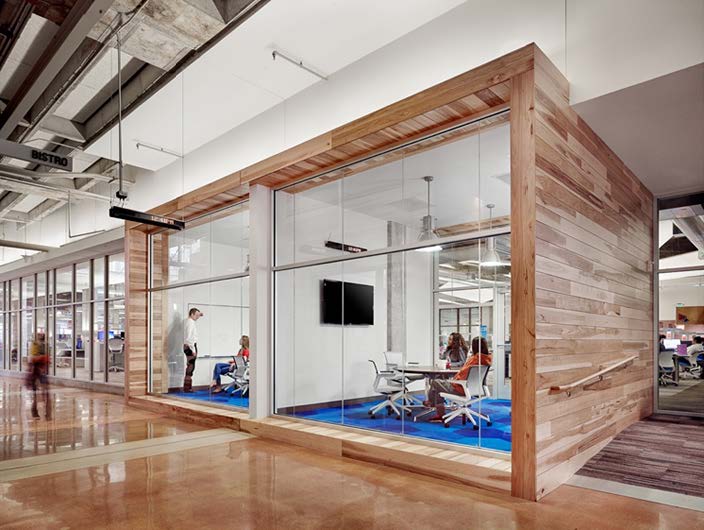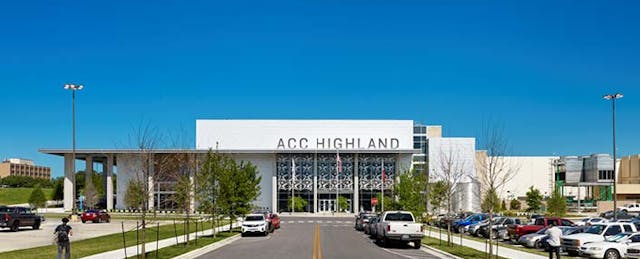When Austin Community College (ACC) saw the city’s oldest suburban indoor shopping center slowly dying, it responded with what may go down as one of the most innovative community college-driven, urban-education revitalization projects of the early 21st century.
First, in 2009, through a partnership with real estate investment and development company RedLeaf Properties LLC, ACC started to buy up the distressed Highland Mall in pieces, beginning with the shuttered Dillard’s and Macy’s stores in 2010, the J.C. Penney in 2011, and finally the entire mall in 2012.
In 2011, ACC and RedLeaf aligned themselves with the City of Austin’s Airport Boulevard Initiative, an effort to reimagine and rejuvenate a car-oriented streetscape. That collaboration put the wheels in motion for the first phase of ACC’s urban-education revitalization aspirations: the reconfiguration of the former J.C. Penney store into a 32,000-square-feet ACCelerator learning lab, which opened in the fall of 2014. Since then, the lab has achieved some impressive results, starting with a successful developmental math course and spreading out into numerous other student-success-oriented services.
Virtualized Workstations Form Lab’s Core
The glass wall-enclosed lab features more than 600 Dell virtualized desktop workstations, classrooms and small-group study rooms. The environment offers a proactive support system, with faculty members, academic coaches, advisors, counselors, tutors and other staff on the premises, modeled, in part, after Virginia Tech’s Math Emporium. The desktop virtualization infrastructure is a robust network that provides students with instant access to campus resources and applications.
The ACCelerator lab is “like a high-technology, modern, one-room schoolhouse,” says the lab’s Director Stacey Güney, outlining the project in EDUCAUSE Review. “Not only are students happy with the environment, faculty members have thrived.”

Students Take Advantage of Multifaceted Services
Two steady visitors to the lab, among approximately 16,000 students and nearly 230,000 student stopovers to date, are 21-year-old Jesus Arreola and 41-year-old James Houston. Both spend significant time in the lab, an average of eight to 10 hours a pop as frequently as three to five days each week.
Arreola came to ACC as a developmental education student with the goal of earning an A.S. that would allow him ultimately to transfer to a four-year school and major in architectural engineering. He recently completed all of his developmental education requirements in reading, writing and math (earning A’s) by taking advantage of the ACCelerator’s personalized learning services.
“If it were not for the ACCelerator with all the tutors and faculty, it would have been much harder for me to succeed,” Arreola says. “It has been very helpful for me to come here and learn something new every day.”
On the other end of the college readiness spectrum, Houston, who has frequently participated in ACCelerator study and review groups, will soon graduate from ACC with an A.A.S. in nursing. He already has a master’s in mechanical engineering and an associate degree in biotechnology. His goal is to earn a PhD in immunology and conduct research in ovarian cancer. Houston says he and his study group colleagues would often reserve an ACCelerator study room at various times over an entire weekend.
“It’s extremely convenient,” he says. “They provide us with enough time and space to look through questions and materials from multiple vantage points.”
Success in Developmental Math
Much of the news about the ACCelerator’s success has centered on its MATD 0421developmental math course, which received national media attention when Jill Biden, who has witnessed student challenges with math during her years as an educator, and Under Secretary of Education Ted Mitchell, paid a visit in March. Biden called the course “empowering,” adding, “I hope other community colleges come and see this and then adopt it on their own campuses.”
MATD 0421 is a competency based course that uses ALEKS, a web-based assessment and learning system from McGraw-Hill Education. Enrolling in the course includes scheduled face-to-face sessions with an instructor, tutoring support, and academic coaching to boost metacognitive skills. Güney notes that withdrawal rates in this course have decreased and retention rates have risen compared to previous developmental math courses. By June 2015, more than 1,100 students had logged over 150,000 hours in ALEKS. Of the ALEKS students in fall 2014 who continued with developmental math in spring 2015, 92 percent returned to the ACCelerator for ALEKS courses.
Overall, Güney says, students who attended the ACCelerator for the first time in fall 2014 were more successful—earned grades of C or better—in developmental courses than non-ACCelerator students by 19 percent.

Branching Out
While the developmental math curriculum was the focus at the start, much more is happening at the ACCelerator.
For example, the lab has started to host community events, such as a recent career fair in which 200 employers were able to utilize the connected workstations to help students fill out online job applications. Additionally, an overnight hackathon was held for about 200 Girl Scouts from central Texas. This summer the ACCelerator will be the site for a Girls Who Code event.
Güney says that she and her staff have a simple job description: “Get people to come, get them to stay, and get them to come back.” One relatively unique way to do that is to allow visitors to eat and drink in the lab, something you typically don’t see in an environment where there are lots of computers.
“Anything we can do to help,” Güney says. “If they are coming straight from work and haven’t eaten all day, they are not going to be fully present if they cannot have a sandwich or a granola bar, or a cup of coffee—whatever it is. Little things like that help.”


